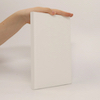
Martin Munkacsi
Autoren
Parameter
Kategorien
Mehr zum Buch
Martin Munkacsi was never at a loss for self-confidence and was proud to be the best-paid photographer of his time. One of the most significant photographers of the twentieth century, Munkacsi shaped the beginnings of modern photojournalism and set into motion the previously static medium of photography. Munkacsi combined journalistic accuracy with a highly formal aesthetic standard, and was an outstanding representative of the “Neues Sehen”, arguably photography’s weightiest contribution to advanced art. He defied convention by incorporating motion, dramatic camera angles and whimsy into his work, creating fashion and sports photography that was groundbreaking and unmatched. Munkacsi’s work unfortunately did not remain intact: scattered throughout the world, it was to an extent lost. Only the Ullstein Archive in Berlin maintains a fairly extensive collection of his life’s work from his days in Hungary and Germany. This second-edition of Martin Munkacsi combines pictures from all Munkacsi’s artistic phases with images and bodies of work that have not been seen since their initial magazine publication. Munkacsi’s work reveals a tense, technologyobsessed, glamorous and contradictory epoch. Martin Munkacsi was born in in Koloszvár, Hungary, published his first sports photos in 1921, and in 1927 moved to Berlin where he worked for Berliner Illustrirte Zeitung, Koralle, Uhu, Die Dame, Vu, Modern Photography and other international magazines. By the time he immigrated to the USA in 1934, Munkacsi had revolutionized fashion photo - graphy. He worked under contract for Harper’s Bazaar, published works in Life to great acclaim and photographed the influential series “How Americans Live” for Ladies’ Home Journal. Munkacsi also worked as an advertising photographer and cameraman for film productions. Largely forgotten, he died in New York in 1963.
Buchkauf
Martin Munkacsi, Franz C. Gundlach
- Sprache
- Erscheinungsdatum
- 2006
Lieferung
Zahlungsmethoden
Deine Änderungsvorschläge
- Titel
- Martin Munkacsi
- Sprache
- Englisch
- Autor*innen
- Franz C. Gundlach
- Verlag
- Steidl
- Erscheinungsdatum
- 2006
- ISBN10
- 3865212697
- ISBN13
- 9783865212696
- Kategorie
- Fotografie & Kameratechnik
- Beschreibung
- Martin Munkacsi was never at a loss for self-confidence and was proud to be the best-paid photographer of his time. One of the most significant photographers of the twentieth century, Munkacsi shaped the beginnings of modern photojournalism and set into motion the previously static medium of photography. Munkacsi combined journalistic accuracy with a highly formal aesthetic standard, and was an outstanding representative of the “Neues Sehen”, arguably photography’s weightiest contribution to advanced art. He defied convention by incorporating motion, dramatic camera angles and whimsy into his work, creating fashion and sports photography that was groundbreaking and unmatched. Munkacsi’s work unfortunately did not remain intact: scattered throughout the world, it was to an extent lost. Only the Ullstein Archive in Berlin maintains a fairly extensive collection of his life’s work from his days in Hungary and Germany. This second-edition of Martin Munkacsi combines pictures from all Munkacsi’s artistic phases with images and bodies of work that have not been seen since their initial magazine publication. Munkacsi’s work reveals a tense, technologyobsessed, glamorous and contradictory epoch. Martin Munkacsi was born in in Koloszvár, Hungary, published his first sports photos in 1921, and in 1927 moved to Berlin where he worked for Berliner Illustrirte Zeitung, Koralle, Uhu, Die Dame, Vu, Modern Photography and other international magazines. By the time he immigrated to the USA in 1934, Munkacsi had revolutionized fashion photo - graphy. He worked under contract for Harper’s Bazaar, published works in Life to great acclaim and photographed the influential series “How Americans Live” for Ladies’ Home Journal. Munkacsi also worked as an advertising photographer and cameraman for film productions. Largely forgotten, he died in New York in 1963.
